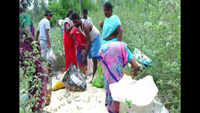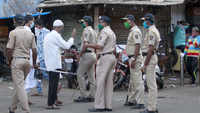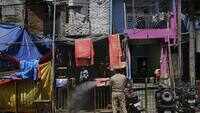
CHENNAI: Students from economically weaker sections, who can’t afford or have no access to Wi-Fi facilities and gadgets, are struggling to attend online classes conducted by educational institutions.
N Nandini, pursuing her final year BA English course, is a first generation graduate student from Arasaveli tribal village in Jawadhu Hills. “While my friends attend online classes, I can’t as we don’t have enough money to buy a net pack,” she said. Her father, an agricultural worker, has been rendered jobless because of the lockdown. “Earlier, in case of doubts, we could check with our staff in person. It feels awkward to ask doubts in front of everyone in an online class. Some of our doubts might sound silly to them,” she added.
With hostels shut, some students have moved to their homes in remote areas, which don’t have good network coverage. Nearly 58% of rural citizens in Tamil Nadu don’t have access to a phone with internet connection, official data from 2019 revealed.
Even villages such as Pappankuppam and Sidharajakandigai near Gummidipoondi, which is hardly 45km from Chennai, lack internet connectivity. “Our professors have created WhatsApp groups to share study material. So, one has to travel till Gummidipoondi town every time to download them. These are heavy files (about 3GB-4GB) and we have to top-up our internet packs almost every day to access the material,” said B Rahul, a student pursing postgraduate physics at a private university in Vandalur.
While these online classes are optional at the moment, educationists fear that students attending these sessions will have an edge if exams are conducted based on this content soon after institutes reopen. “For no mistake on their part, they (students with no internet facility) are made to face the challenge of learning and appearing for exams on par with the affluent sections of the society, which is blatant state-sponsored discrimination,” said educationist Prince Gajendra Babu.
Even those residing in city limits face issues with online classes. With many parents working from home, sharing the internet load with their children has reduced the facility’s speed. “What is the need to have such sessions for Class III students,” asked P Senthil Kumar, a parent from Iyyapanthangal.
N Nandini, pursuing her final year BA English course, is a first generation graduate student from Arasaveli tribal village in Jawadhu Hills. “While my friends attend online classes, I can’t as we don’t have enough money to buy a net pack,” she said. Her father, an agricultural worker, has been rendered jobless because of the lockdown. “Earlier, in case of doubts, we could check with our staff in person. It feels awkward to ask doubts in front of everyone in an online class. Some of our doubts might sound silly to them,” she added.
With hostels shut, some students have moved to their homes in remote areas, which don’t have good network coverage. Nearly 58% of rural citizens in Tamil Nadu don’t have access to a phone with internet connection, official data from 2019 revealed.
Even villages such as Pappankuppam and Sidharajakandigai near Gummidipoondi, which is hardly 45km from Chennai, lack internet connectivity. “Our professors have created WhatsApp groups to share study material. So, one has to travel till Gummidipoondi town every time to download them. These are heavy files (about 3GB-4GB) and we have to top-up our internet packs almost every day to access the material,” said B Rahul, a student pursing postgraduate physics at a private university in Vandalur.
While these online classes are optional at the moment, educationists fear that students attending these sessions will have an edge if exams are conducted based on this content soon after institutes reopen. “For no mistake on their part, they (students with no internet facility) are made to face the challenge of learning and appearing for exams on par with the affluent sections of the society, which is blatant state-sponsored discrimination,” said educationist Prince Gajendra Babu.
Even those residing in city limits face issues with online classes. With many parents working from home, sharing the internet load with their children has reduced the facility’s speed. “What is the need to have such sessions for Class III students,” asked P Senthil Kumar, a parent from Iyyapanthangal.

Coronavirus outbreak
Trending Topics
LATEST VIDEOS
More from TOI
Navbharat Times
Featured Today in Travel
Get the app









